How to Help with Teenage Depression
When dealing with depression, help yourself and help others help you.
Depression is tough to beat. Anything beyond mild depression will require support. That’s not because you’re inadequate if suffering from depression. It’s because depression is so tough and, by its nature, it diminishes the energy and motivation you have to fight. What follows is guidance on how to help with teenage depression, how you can help yourself, and how others can help you.
Being the Author of Your Life
The core challenge in fighting depression – as it is in being a teenager – is to become the author of the experience as much as possible. If you are depressed, you won’t feel like the author of your life, which is one reason depression is such a tough opponent.
To be the author includes taking care of yourself and getting the help you need from your supporters – peers, trusted adults, professionals, and groups/organizations.
How to Help with Teenage Depression – Part One
The first part of this section is guidance on what you can do for yourself to be the author and fight your depression. The challenge is to weave together what you can do for yourself, what others can do to support you and what professionals can do.
How to Help with Teenage Depression – Part Two
The second part of this section is built around a set of guidelines that you can give to your helpers to “help them help you.” Giving your helpers some guidance in how to support you is surprisingly important. It’s a powerful way for you to get some control over your experience – being the author even in a situation that makes it very hard to do so. Most of your helpers won’t be experts in this area, so this matters – a lot,
Beating depression is usually a team effort and you can play a major role in guiding your team. This section will also give you a lot to help you support a depressed peer if that is a role you find yourself in.
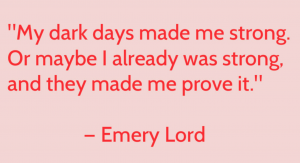
Part One: How Can I Help Myself?
There is no simple answer for countering depression. It’s really a matter of committing to act in a number of areas and persevere and be patient over time – even when you don’t feel like it. Success results from a combination of actions that you can take with support from others that makes the difference.
Warning! Remember that depression will naturally sap your energy and motivation and often leave you feeling powerless and like a victim – certainly not the author of your experience. That’s not because you are inadequate – it’s just the nature of depression.
The key is to simply act even though you might not feel like it or see guaranteed success. That’s very hard to do, so you will need to make a major commitment to yourself to employ some of these actions.
Sometimes you have to do these actions for a while before the energy and motivation begins to kick in. That’s one reason that countering depression is so tough. The good news is that the perseverance and patience that you develop will serve you for the rest of your life.
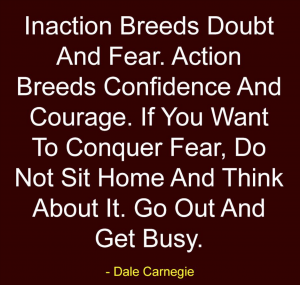
Ten Actions You Can Take
- Talk with others daily, including an adult (even for just a few minutes)
- Educate yourself about depression and how to beat it, including stories of others who have beaten it
- Limit screen time – it’s OK to use screens to escape and get some relief or connect with others, but don’t let it interfere with the activities that will help you beat depression
- Try new connections with individuals and/or groups – face to face or online
- Engage in some new activities – some won’t work, but some will
- Restart activities that you used to enjoy
- Get some exercise. You don’t have to train like a tri-athlete, but get exercise 3-4 days a week – preferably for an hour
- Eat a healthy diet – again, you’re not training for a triathlon, but focus on eating healthy foods and limit the bad stuff
- Avoid drugs and alcohol – they just make depression worse
- Get enough sleep, but not oo much – there is a whole science around sleep, so explore to see what works for you

A Note About Habits. Try to make these activities habits. Habits are powerful because once they are formed, they do their work without you having to think about them or make choices all the time. And forming good habits is more powerful than trying to break bad habits. So take advantage of having to fight your depression now and form some good habits. They will be good to have even after you beat your depression.
We first make our habits - and then our habits make us.
Unknown
Part Two: How Can Others Help Me? How do I “Help Them Help Me?”
Few people are trained to help someone suffering from depression, so it’s important to “help your helpers help you.”
Here are some guidelines that you can give your helpers – friends, parents, other trusted adults. These notes are written to these helpers. You can simply refer your helpers to these guidelines – and you can add or make changes if there is something missing or something doesn’t seem right to you.
Guidelines for Helping Teens Manage Their Depression
These guidelines are for anyone who is committed to helping a teenager manage her or his depression. They are written to parents, but can be adopted by friends or other trusted adults.
Fighting depression is not an individual sport – it’s a team sport – so you’re important. It’s not that an individual is inadequate – it’s because depression is such a tough opponent.

If your teenager is asking you to help them, do it. If they are not asking for your help and you see significant signs of depression, provide the help anyway. That may cause some friction or conflict, but the help needs to be provided.
There is no formula for this, so it can be confusing, and frustrating, and sometimes even scary. You will need to manage your own thoughts and feelings and behaviors in this process and you won’t always get everything exactly right.
AND this will be happening during the time when your relationship with your teenager is morphing from a parent/child relationship to a parent/teenager relationship on the way to a parent/young adult relationship.
You can’t control the experience of your teenager or fix their depression. You can, however, be a powerful support for them as they fight to overcome their depression – helping to keep them safe and helping them develop a bunch of qualities and capabilities (noted earlier) as they battle the depression.
You can be present, you can connect, you can listen, you can guide, you can model behavior, you can mobilize other help, and you can be patient (and take care of yourself in the process). These guidelines will help you do that and be a critical part of the “team.”
The Guidelines
- Connect – Be Present
- Don’t Try to Fix Their Problem – Guide and Encourage
- Know When to Seek Professional Help and Support Your Teenager Through it
- Take Care of Yourself and Your Family
Guideline #1: Connect – Be Present
You don’t have to be an expert with the answers to make a difference. You do need to connect and be present. It’s important to involve experts in most cases, but they don’t take your place.
Note. The natural morphing of the child/parent relationship to a teen/parent relationship complicates connecting and being present to help with depression. But it also provides an opportunity to develop the new more mature parent/teenager relationship and maybe even leapfrog to a parent/young adult relationship.
Should I Listen? Ask Questions? Talk?
Yes. Focusing on listening is critical, but a depressed teenager may not talk a lot. Asking questions can draw a person out, but it can also feel intrusive and sometimes overwhelming. The big pitfalls are asking questions that sound accusatory, like a demand to justify the feelings of depression, or questions that sound like an attempt to get control of the situation and meet your needs vs. theirs.
Sharing experiences you have had with depression or other tough life problems can create connection and common ground, but it can also sound to a depressed teenager like lecturing or being self-centered.
Being present and connected is one of the tougher challenges in supporting a depressed teenager and there is no recipe or formula. Sometimes you can actually be present, but not feel very connected. It requires a lot of patience and perseverance and probably dealing with being rebuffed multiple times and feeling frustrated, incompetent and often anxious or scared.
Listening
Often the challenge with listening is overcoming the need to make a difference – quickly. The key is the quote by Steven Covey.
Seek first to understand and then to be understood.
Steven
Covey
Even seeking to understand can feel intrusive and you may get rebuffed repeatedly, but that’s part of the journey, so persevere.
Asking Questions
You can sometimes open up a conversation and position yourself for listening by letting your teenager know what specific symptoms of depression you’ve noticed and why they worry you. Then you can ask them to talk about what they are going through in general or as it relates to a specific symptom. You can even use the lists of symptoms from the “Symptoms” section to help the conversation as the lists can help define the experience s. the teenager having to come up with the terms. You just have to make sure it doesn’t feel like test or box you are that an external source is controlling their experience.
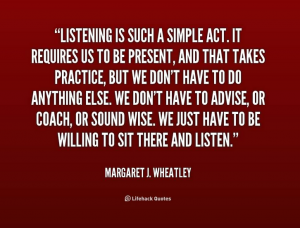
Talking
Focusing on listening doesn’t mean that talking is a bad thing, but it is rarely the best lead. Nor do you need to just be passive or reactive. There is a Guideline that follows that addresses ways to guide and encourage your teenager and that can help figure out the balance you want between listening, asking questions and talking.
Being Transparent
You can help your teenager be open to hearing you when you talk with them about their depression by being very clear about what your intentions are in asking questions or talking with them. For example, you can say things like the following (or even write them down for your teenager):
- “I don’t mean to pry or be intrusive. it’s just that I care and I want to understand.”
- “I am not being judgmental, so if it feels that way, challenge me.”
- “I certainly don’t have all the answers, so I’m not lecturing.”
- “When I share any of my experiences with life challenges I’ve faced I’m not saying they are the same as what you face or that I know what you’re feeling.”
- “At some point I do want to do some joint problem-solving with you because that’s important, but we will be finding the way together because there is no recipe for this.”
- “I know that you won’t always want to hear from me and will push me away and I will respect that, but I won’t go far – and I’ll be back because the best thing I can do is be present.”
Empathize With Them
This can actually be painful and even scary. If you have experienced depression, you will understand just how tough a path recovery can be. It’s hard to know that your teenager is on a similar path. If you haven’t experienced depression, it might be tough to put yourself in their shoes, but it’s worth the effort, even though it will be uncomfortable.
Simply acknowledging the pain and sadness they may be experiencing can go a long way helping them feel understood and connected.
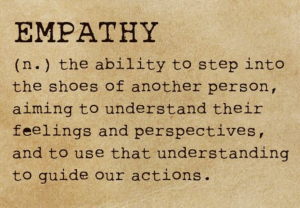
The major pitfall that empathy helps avoid is trying to talk your teenager out of their depression. The feelings of depression can seem to be irrational or overblown. Even well-meaning attempts to explain why “things aren’t all that bad” can come across as though you don’t take their feelings seriously – as though “you just don’t get it” – or don’t want to get it. Empathy helps establish and protect the connection.
Be Patiently Persistent – in a Flexible Gentle Way
Remember that the path is along one and you and your teenager will be “learning the way” because there is no specific formula to follow. One of the toughest challenges is to be patient in a flexible and gentle way.
Patience is not passive, it is concentrated strength.
Bruce
Lee
You will face resistance – a large part of that is the depression talking – but don’t personalize it. Don’t give up if your teenager shuts you out at first – or repeatedly. Don’t give up when your guidance and encouragement is “yes-butted.” Don’t give up when even the best thought out words or actions don’t get the hoped for results.
Don’t give up when the professionals you rely on initially don’t work out (thats’ not uncommon as it’s always a matter of “fit”). And don’t give up when you run short of energy, confidence or hope.
It's not that I'm so smart, it's just that I stay with problems longer.
Albert
Einstein
Being persistent and resilient is a commitment you can make to yourself and your teenager. The nature of depression will challenge that commitment at times. And your teenager will be watching to see if they can count on you – that you will be up to the challenge and are strong enough to support them.
Guideline #2: Don’t Try to Fix Their Problem – Guide and Encourage
If your teenager is suffering from depression, it is going to be painful for you and there will naturally be a strong desire to alleviate the suffering and “solve” the problem. But, you can’t solve the problem. You can “guide” and you can “encourage”, but you can’t “solve.”
That’s not all bad because in the process of recovering from their depression your teenager can develop a lot of the capabilities and qualities required for success as a young adult. Those range from persistence, courage and resilience to relationship skills, problem solving and a deeper understanding of human nature.
In a way, recovering from depression is a crucible in which critical strengths and abilities can be forged under pressure. It can actually accelerate your teenager’s maturity.
Life doesn't get easier or more forgiving, we get stronger and more resilient.
Steve
Maraboli
When your teenager is ready you can problem-solve together and you can provide resources. If your teenager is in serious trouble you may need to fast forward the problem solving and resource engagement, but most of the time it’s going to be a process of patiently and persistently guiding and encouraging.
You can problem solve together, commiserate together when some things don’t work out, problem solve some more, celebrate when things do work out and learn from the experience together.
Note to Teenagers
It’s OK for your parents to encourage you to engage in action – if they have been present, listening and empathic. They care, so don’t expect them to sit still and watch you suffer.
Remember. If you are depressed you probably won’t have the energy or motivation to respond powerfully, so borrow some of your parents’ energy and motivation. Don’t just reject their ideas and encouragement. Try some out and see what happens. That may take some time, so persevere and don’t give up quickly. The same holds tru for encouragement and suggestions from peers and other trusted adults.
Taking advantage of support is part of being the author of your life, so manage the support, don’t just ignore or reject it.
Life isn't about finding yourself. It's about creating yourself.
George Bernard
Shaw
Encourage Social Connections
Remember that the key term here is “encourage.” You are not prescribing and not “shoulding.” The depression will suppress the energy (and confidence) for social connection, so your voice is countering the depression. You are not taking charge or solving the problem. You are guiding and encouraging – balancing the depression.
Combat Social Isolation
Do what you can to keep your teenager connected to others. Depressed teens tend to withdraw from friends as well as activities they normally enjoy. These are major problems because depression naturally undermines efforts to reconnect to people and activities.
One option is to encourage your teenager to choose a few people – peers, family members, teachers, coaches, counselors, neighbors, faith community members – to whom she or he can be in touch once a day. Face-to-face is ideal, but online is better than no contact. There may also be online groups with which to connect.
Another option is to help your teenager get connected or reconnected to organized activities. These can be anything from sports to performing arts to volunteer work and community groups.
A third option is to start or restart daily activities and habits. These are just options, so don’t be restricted by them. Staring small and building connections is fine – and in a lot of cases is the only way that will work. Over time however, the more connections and activities the better.
Make Face Time a Priority
Set aside time each day to talk – time when you’re focused totally on your teenager – without distractions and multi-tasking. Daily face time may be too much at times. But the regular commitment – even if frequently rejected – is a powerful message and provides a space where a lot can happen.
This is Not a Transactional Deal
This is not a matter of thinking, “If I do this, my teenager will do that” – and often feeling scared and like a failure when it doesn’t happen. It’s a matter of doing the right thing and trusting that over time the support will make a difference – it will be enough. Teenagers are savvy and really don’t miss much and, even when depressed, they hear and see more than we think.
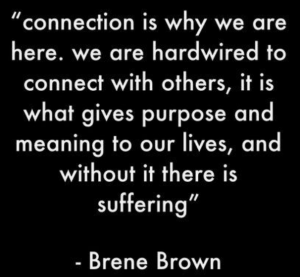
Make Physical Health a Priority
Physical and emotional health are closely connected and this is particularly true for depression. Depression is reinforced by inactivity, inadequate sleep, drug and alcohol abuse, screen addiction and poor nutrition. Teenagers are vulnerable to all these factors.
You can’t control all those factors, but you can provide some balance. For example, you can:
- Encourage and facilitate some form of exercise 3-4 times a week (ideally an hour a day, but anything helps)
- Reinforce healthy sleep patterns (this can be a tough one)
- Provide nutritious meals and snacks. It may be a challenge to get them eaten and you may need to be very creative
- Set limits on screen time. Teens often go online to escape their problems, but when screen time goes up too much, physical activity and time with others goes down and sleep can be significantly affected if screen time goes too late. This is one area where more prescribing and enforcing is required.
- Limit or stop drug and alcohol use. This is another area of escape and it can significantly reinforce depression. It can also be tough to limit or stop.
Remember. You will likely get rebuffed a lot (actively or passively) as you try these things, but that’s the depression and probably your teenager separating from you, which is a natural part of the change from parent/child to parent/teen relationship.
Don’t take it personally and be persistent, patient and flexible. If you are connected to other parents and/or professionals you can creatively strategize and get support.

Guideline #3 – Know When to Seek Professional Help and Support Your Teen Through it
Always seek treatment immediately if your teenager shows signs of suicidal thoughts or actions. Err in the direction of getting professional help. It’s better to ask for forgiveness if you overreact than to grieve for actions not taken. There are two sections on the site regarding suicide – they are in the “Specials” section.
Support from family and peers along with healthy lifestyle changes can make a big difference for depressed teenagers, but it’s not always enough. It might be enough in cases of mild depression, but beyond that professional help is key – particularly professionals with a specialty and experience with teenagers. Your family physician can be a resource (and possibly make a good referral), but you will probably need a psychotherapist and a psychiatrist – for managing medications.
You can get recommendations from a trusted source, look at professionals’ websites, blog posts and publications, but finding the right professionals with whom you have a good fit can be a challenge.
Always get your teenager’s input. If you want your teenager to be motivated and engaged – being the author of their experience – don’t ignore their preferences or make unilateral decisions.
(For more information on treatment, see the Treatment section that follows.)
Support Your Teenager Through Treatment
As your depressed teenager goes through treatment, the most important thing that you can do is let them know that you’re there to listen and offer support. Now, more than ever, your teenager needs to know that they are valued, accepted and cared for.
Get the Right “Fit”
No one therapist is the answer for everyone and no one treatment works for everyone. If your teenager (and you) does not feel OK with the therapist and/or psychiatrist, seek out a better fit. This is not an unusual occurrence, but make sure it is a lack of fit and not just resistance to treatment.

Stay Involved in Treatment
Make sure your teenager is following all treatment instructions, whether it is attending therapy sessions or correctly taking any medications prescribed. Track changes in your teenager’s condition and call the professionals if symptoms seem to be getting worse. And be involved to the degree that the professionals want you to be involved.
Be Patient
The road to getting free of depression can be bumpy and frustrating, so be patient and encourage your teenager to also be patient and persevere. Celebrate the small victories on the path and prepare for the setbacks that are likely to be encountered.
At times you may experience exhaustion, rejection, aggravation, frustration, anxiety, confusion and even despair. As hard as that can be, those thoughts and feelings need to be acknowledged and dealt with so that you can stay healthy and be available to support your teenager. This is another reason to be connected to others, particularly other parents.
Keep in mind that being a teenager is a rollercoaster experience and recovering from depression won’t be smooth – and you’re on the rollercoaster too.
Note to Teenagers
The professionals you work with are not there to run your life. They are there to support you and help you be the author of your experience. You may not always like working with them because they can be challenging, but they are there primarily as guides at a particularly tough time on your journey to young adulthood. If you’re in a tough part of your journey, you will want tough guides.

They will not have all the answers immediately, but they will work with you to discover the answers and their experience and expertise will be invaluable.
Also Note. Rather than just “recover” from depression, you might be able to actually accelerate your progress on the path to becoming a successful young adult. Remember that a lot of growth happens outside your comfort zone, so in battling with your depression you can potentially develop a lot of courage, perseverance, resilience, problem-solving capabilities, self-awareness and awareness of life in general. You’re going through a tough period, so you might as well get as much out of it as possible.

Guideline #4 – Take Care of Yourself (and the Family)
As a parent you may find yourself focusing most of your energy on your depressed son or daughter and neglecting your own needs and those of the rest of your family. That can’t last for long without consequences.
Above all this means reaching out for support. You can’t do everything on your own for long, so enlist the support of family and friends and possibly professionals. Having your own support system in place will help you stay healthy and positive so that you can work with your teenager. And – in taking action to care for yourself, you are powerfully role modeling healthy behavior for your daughter or son.
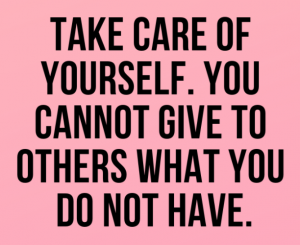
The following strategies are useful and you will very likely find others that work for you.
Educate Yourself
The more you know about the teen journey and about depression in particular, the more sure and confident you can be in determining how to play your role. This is particularly important when things don’t go exactly as hoped and doubts can creep in.
Don’t Bottle Up Your Emotions
This is going to be a rollercoaster for you too. It’s OK (and hard to avoid) feeling frustrated, helpless, overwhelmed, angry, and anxious at times. Talking about how you feel, including the successes, will help defuse the power of the “down” feelings on the rollercoaster.
Look After Your Health
The stress of your teen’s depression can affect your own moods and emotions as well as your physical health. Support your well-being by eating right, getting enough sleep and exercise and making time for people and activities you enjoy.
Self-care is giving the world the best of you, instead of what's left of you.
Katie
Reed
Be Open with the Family
Don’t tiptoe around the issue of teen depression in an attempt to “protect” other children in the family. Kids know when something is wrong and will be affected by it. Be open about what is going on and invite your other children to ask questions and share their thoughts and feelings. And save some energy and attention for the “healthy” members of the family, including getting them help if they need it.
Connect with Others
Helping your son or daughter deal with their depression is a long tough journey and it’s not one that goes well if you try to do it alone – anymore than it will for your teenager. You can reach out to extended family, friends, other parents, groups or professionals – from leaders of a faith community to therapists. Connections can be face to face and/or online. The more the better.

